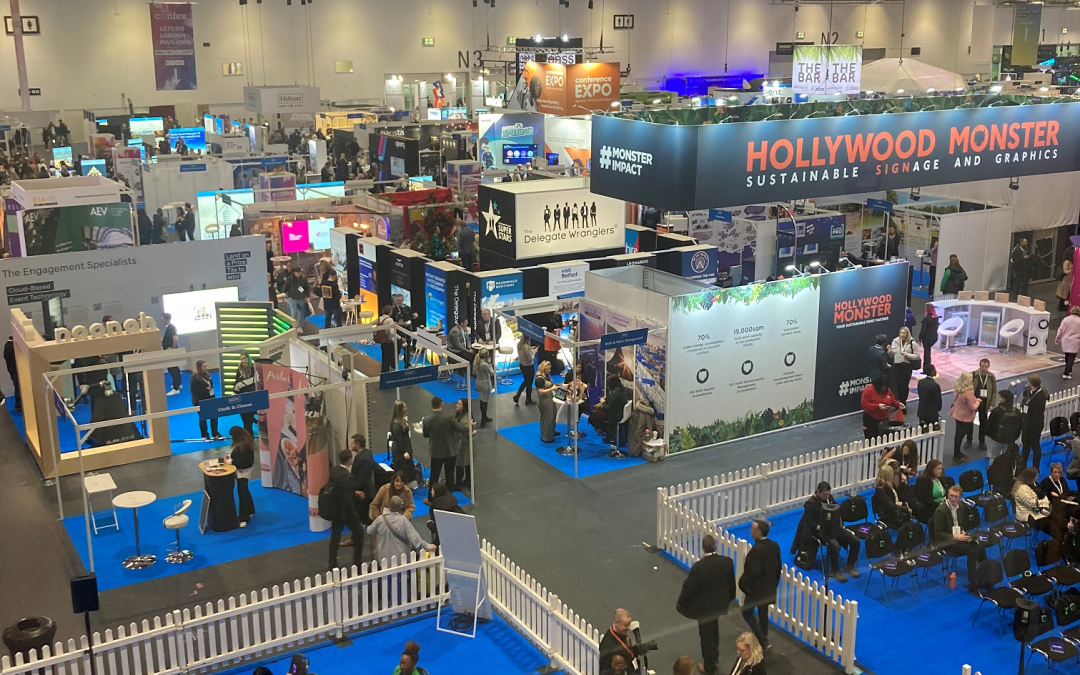We attended Confex on its 2nd day, with a jam-packed schedule of meetings lined up and plenty of talks that we wanted to see. It was an absolute pleasure to soak up all the great content, and to see so many industry peers (not via a Zoom call)! Hear all about our day below:
*
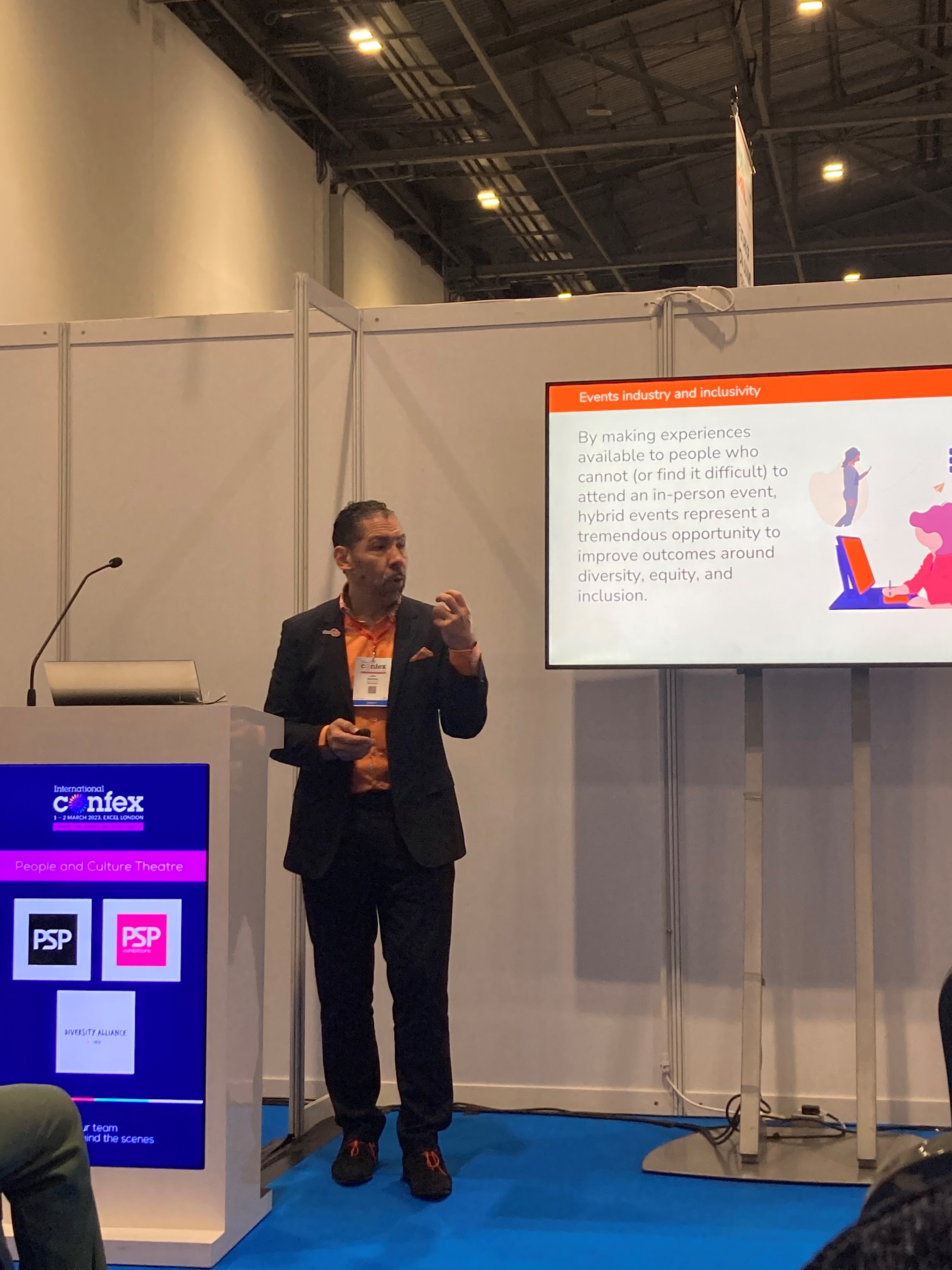 In a study about who the events industry most serves (and who it doesn’t), it was found that extraverted men were best served by it whilst introverts and neurodivergent people were least served by it, John Martinez (Shocklogic) shared with us in his session on inclusive events. He talked about the importance of taking DEI into consideration at every stage of the process from marketing to the post event feedback and broke down exactly how event organisers can do this.
In a study about who the events industry most serves (and who it doesn’t), it was found that extraverted men were best served by it whilst introverts and neurodivergent people were least served by it, John Martinez (Shocklogic) shared with us in his session on inclusive events. He talked about the importance of taking DEI into consideration at every stage of the process from marketing to the post event feedback and broke down exactly how event organisers can do this.
When it comes to inclusive marketing, John encouraged companies to make a clear statement about the location/ venues dedication to inclusivity and features offered. He also suggested using inclusive images, accessible fonts and offering alternative text for images. In the leadup he also recommended getting organisers to think about their registration forms, adding in functionality for the form to be read for those are visually impaired, for example.
Features that can make the design of the event itself more inclusive, include gender neutral bathrooms, prayer rooms, calm rooms and accessible parking. Catering options need to be thought about, whether that’s offering vegan options or soft drinks. Signage without words or in different languages is also something to consider.
“Sometimes because we can’t do one thing, we tend to hold back and do nothing,” John said, encouraging people to do what they can. “The conversation with Gen-Z is going to be really important and we need to be able to meet them there,” he said, as he finished the session.
*
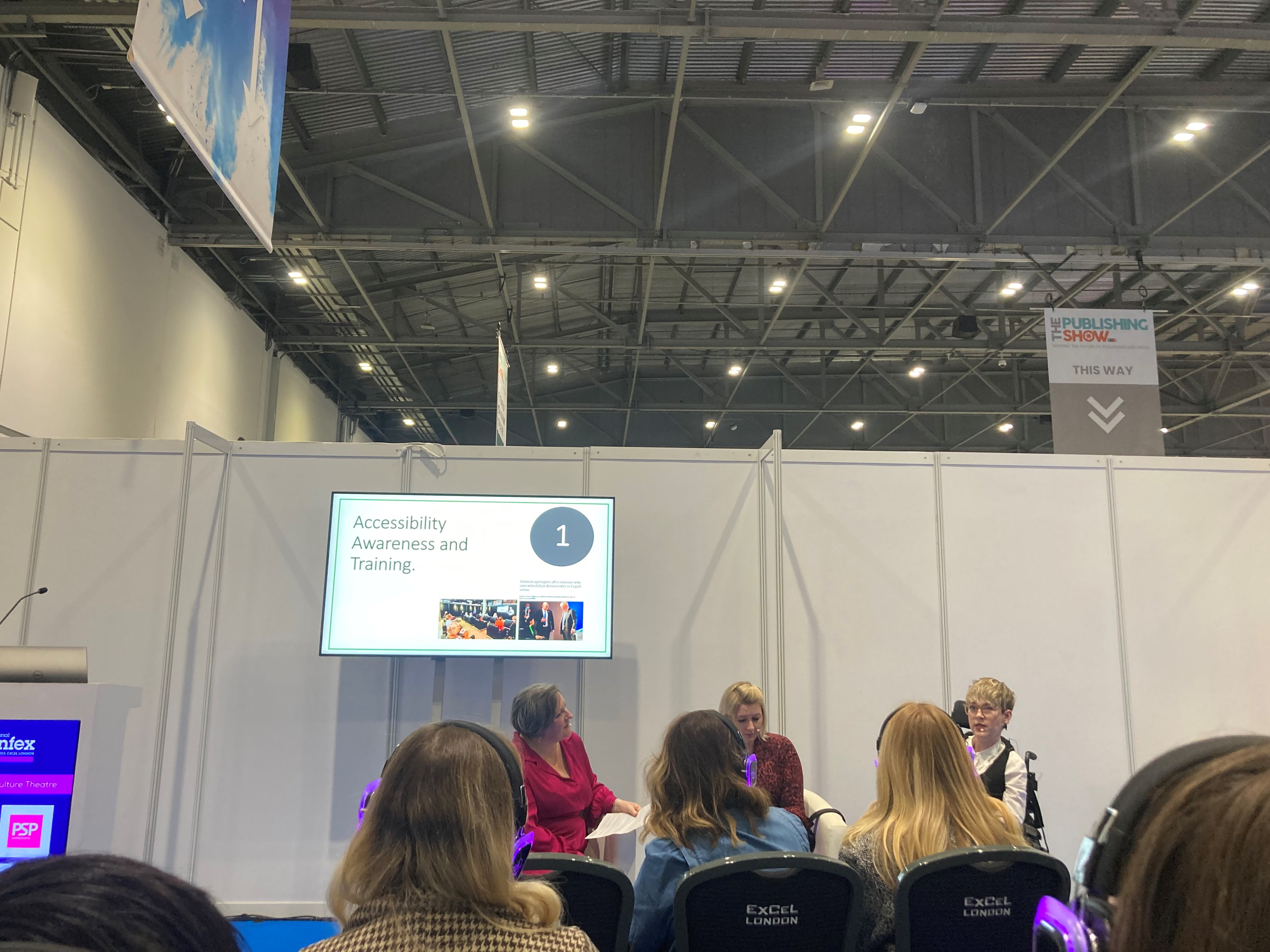 Emma Ord (Emma Ord Event Operations) and Sarah Rennie (Rennie Consulting) then spoke in a panel facilitated by Lou Kiwanuka (The Ops Nest) on accessibility. 1 in 5 of the UK population is disabled and yet so many events don’t cater for them. Emma and Sarah shared their five top tips for ensuring accessibility at events:
Emma Ord (Emma Ord Event Operations) and Sarah Rennie (Rennie Consulting) then spoke in a panel facilitated by Lou Kiwanuka (The Ops Nest) on accessibility. 1 in 5 of the UK population is disabled and yet so many events don’t cater for them. Emma and Sarah shared their five top tips for ensuring accessibility at events:
- Accessibility, awareness and training. People often want to do the right thing but aren’t sure how. Think about fun ways to engage people!
- Proactively ask what people need. For example, don’t ask people to tell you what their disability is but ask them what you can do make sure the event is accessible and comfortable for them.
- Give people the information to make informed decisions. Over-communicate! Then a person can make a decision about whether this event is for them. Asking questions of venues can also push them to think about their spaces and accessibility for future events.
- Facilities and services. Look at the whole journey for an attendee/ your talent/ employees etc, from registration to the event itself to post event.
- Be cautious if outsourcing responsibilities to 3rd parties. Do your homework and double check what suppliers tell you, especially when temporary staff are being brought in. Have they been trained?
Emma and Sarah recommend being wary of venues that say they are fully accessible, and always question this. Sometimes it is conflated with having step free access, for example. Like John, they encouraged event professionals looking to create more accessible events to “be honest with what you can and can’t do, and how to improve.”
*
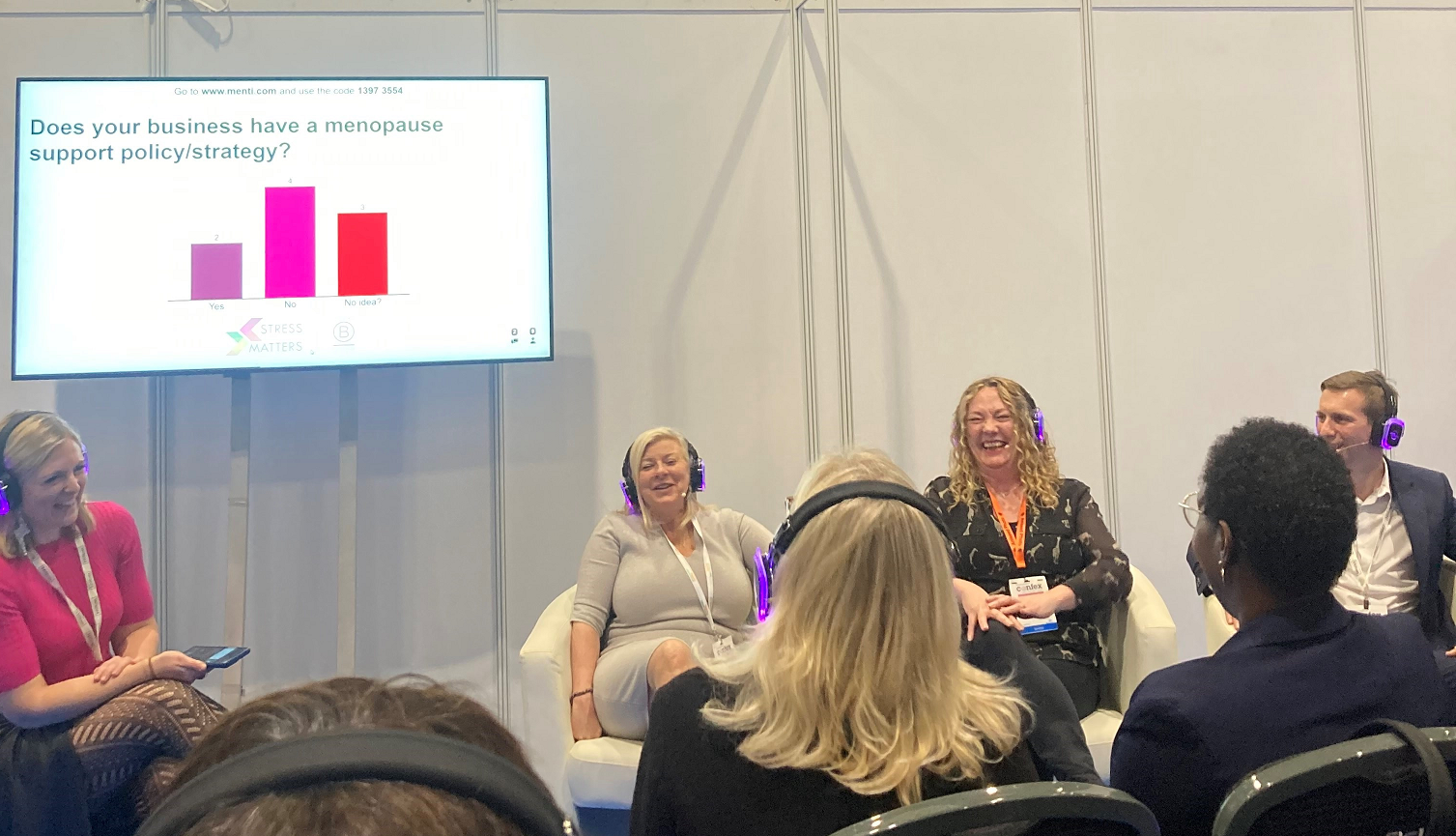 Laura Capell-Abra (Stress Matters) then brought together Fay Sharpe (Fast Forward 15), Jill Hawkins (Aniseed PR) and Tim Sparrow (The Eastside Rooms) discussed the taboo around menopause, and how employers can create policies and environments to support people dealing with the symptoms of it.
Laura Capell-Abra (Stress Matters) then brought together Fay Sharpe (Fast Forward 15), Jill Hawkins (Aniseed PR) and Tim Sparrow (The Eastside Rooms) discussed the taboo around menopause, and how employers can create policies and environments to support people dealing with the symptoms of it.
They agreed on the need for employers to hold open space for this conversation, so employees can share what they’re struggling with. Fay recommended doing workshops for the whole office to demystify menopause. “And then if you do have symptoms it’s not a taboo subject,” she said. Jill encouraged companies to put together a menopause policy. Even if it’s just a couple of sentences, a policy acknowledges the impact of menopause and makes clear that conversations about it are allowed. As a freelance consultant Jill also shared her experience of having to talk openly and directly with her clients, especially when it came to symptoms such as brain fog.
They group reminded the attendees that menopause is different for everyone. Just because you, or a woman you know, don’t experience that symptom doesn’t mean it isn’t awful for someone else. But one thing the many symptoms can have in common is their impact on confidence. 25% of women experiencing menopause consider leaving their roles. The panellists express a feeling of invisibility as they go through this process, one that can last up to a decade.
*
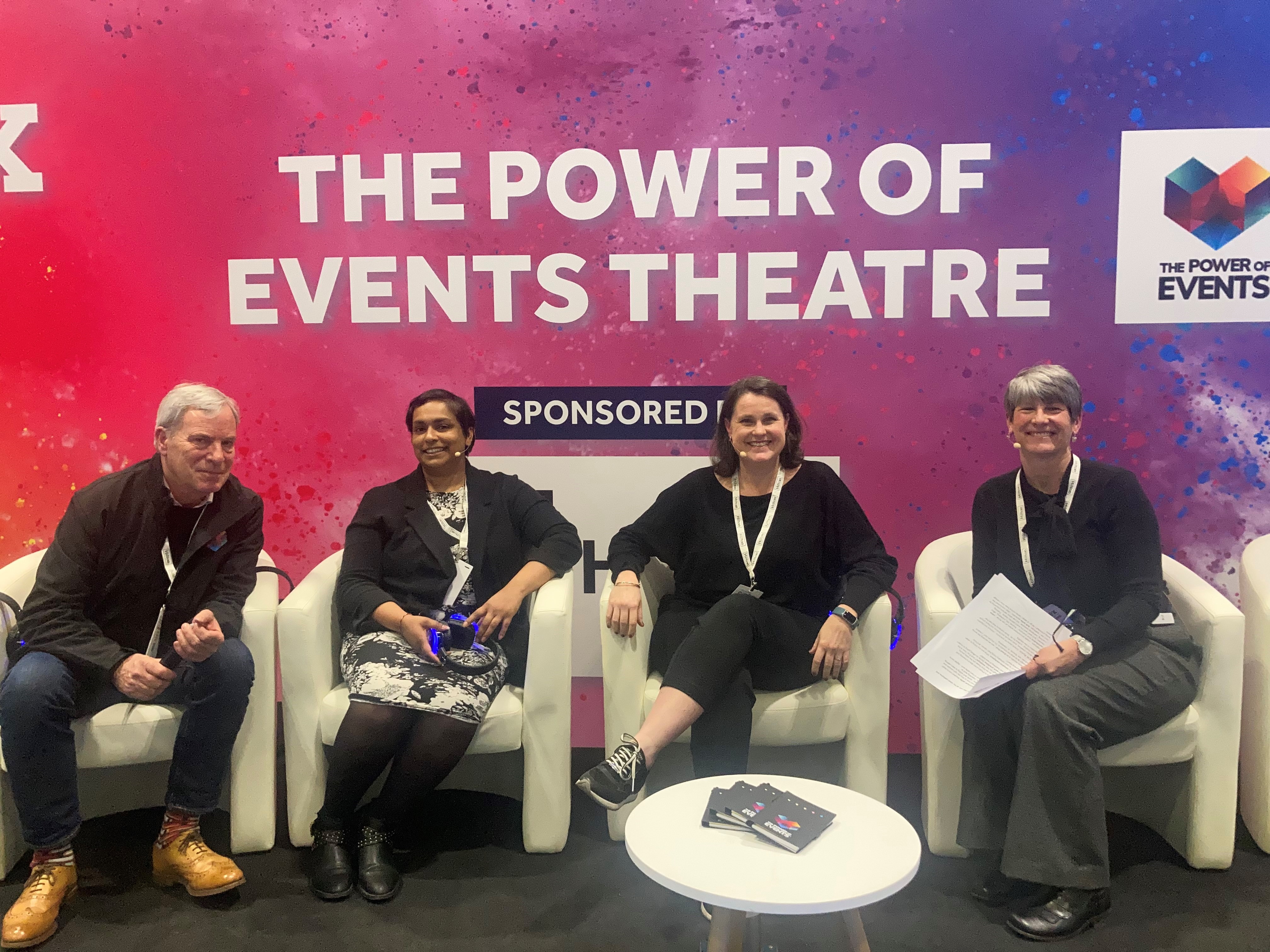 Finally, we went to see our Exec-Director Claire Fennelow facilitating a panel about skills and experience, and the options that are out there to develop and maintain expertise relevant to an ever changing market. Claire interviewed Priya Narain (Purpose and Impact Manager, Co-Founder & Diverse Speaker Bureau – KERB, Event First Steps), Rosie Ham and Simon Hughes (Power of Events) about the different ways into the industry including the Event Academy and apprenticeships. They talked about the mismatch sometimes found between education and industry, and the way formal education and experience can be pitted against each other.
Finally, we went to see our Exec-Director Claire Fennelow facilitating a panel about skills and experience, and the options that are out there to develop and maintain expertise relevant to an ever changing market. Claire interviewed Priya Narain (Purpose and Impact Manager, Co-Founder & Diverse Speaker Bureau – KERB, Event First Steps), Rosie Ham and Simon Hughes (Power of Events) about the different ways into the industry including the Event Academy and apprenticeships. They talked about the mismatch sometimes found between education and industry, and the way formal education and experience can be pitted against each other.
Simon encouraged looking for opportunities to volunteer, although Priya also advocated for the industry creating more paid opportunities for people wanting to enter the industry. Rosie spoke about the soft skills required to work in events and said these are the core skills employers are asking for. Everything else can be taught. Priya added, “I don’t think there’s a skills shortage. What there is a shortage of is training and development.” All three panellists recommended joining communities on your journey.
Learning and development, they agreed, need to be seen as a necessity not a nice to have, no matter how busy you are. And it’s worth trying to encourage clients to back this too.
*
After a packed day of content and meetings we left Confex 2023 for another year, full of ideas and inspiration for the coming months.


